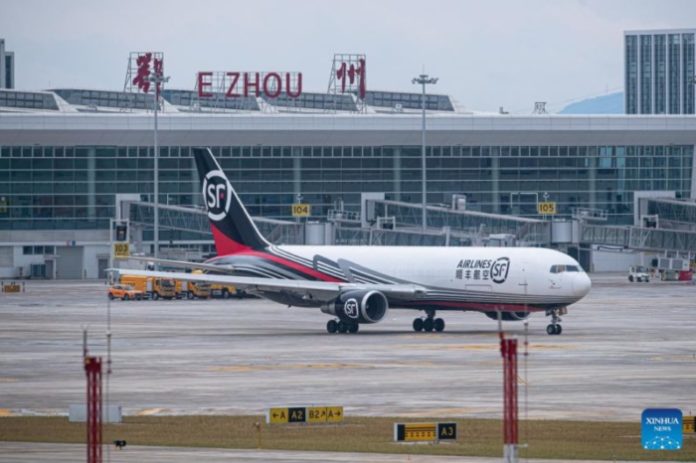
-
Ezhou Huahu Airport officially began operations, simultaneously as China’s and Asia’s first professional air cargo hub and the world’s fourth
-
The hub has 23,000 square meters cargo terminal, a freight transit center of nearly 700,000 sqm, 124 parking stands and two runways
-
The airport, SF Express’ home, is tipped to open about 10 international and 50 domestic cargo routes by 2025, with cargo and mail throughput reaching 2.45 million tons
A Boeing 767-300 cargo plane took off from the Ezhou Huahu Airport in central China’s Hubei Province at 11:36 a.m. Sunday (July 16) launching both China’s and Asia’s first professional air cargo hub and the fourth of its kind in the world, Xinhua reported.
The new airport, with a cargo terminal of 23,000 square meters, a freight transit center of nearly 700,000 sqm, 124 parking stands and two runways, is expected to improve the transport efficiency of air freight and further promote the country’s opening up, the state news agency said.
Ezhou Huahu Airport conforms to the needs of China’s development, said Su Xiaoyan, senior director of the airport’s planning and development department.
The number of parcels handled by China’s courier companies hit a record high of more than 108 billion last year, and should maintain stable growth in 2022, according to the State Post Bureau.
Ezhou airport’s functions are benchmarked against the Memphis International Airport in the United States, home of Federal Express and one of the world’s busiest air cargo hubs.
SF Express, China’s leading logistics service provider, plays a crucial role at Ezhou airport, much like how FedEx Express handles most of the cargo at the Memphis Airport.
SF Express holds a 46% stake in Hubei International Logistics Airport Co., operator of Ezhou Airport. The logistics service provider has independently built a freight transport transit center, a cargo sorting center and an aviation base at the new airport. SF Express also plans to process the majority of its packages through the new airport in the future.
“As a cargo hub, Ezhou Huazhu Airport will help SF Express to form a new comprehensive logistics network,” said Pan Le, director of the airport’s IT department.
“No matter where the destination is, all SF Airlines cargoes can be transferred and sorted in Ezhou before being flown to other cities in China,” Pan said, adding that such a transportation network will enable SF Express freight planes to operate at full capacity, hence improving transportation efficiency.
The landlocked city of Ezhou is hundreds of kilometers away from any seaports. But with the new airport, goods from Ezhou can reach any point in China overnight and overseas destinations in two days.
“The airport will promote the opening up of the central Chinese region and the whole country,” said Yin Junwu, director of Ezhou Airport Economic Zone Management Committee, adding that airline and shipping companies from the United States, Germany, France and Russia have already reached out to forge cooperation with the airport.
Besides cargo flights, the airport provides passenger flight services for eastern Hubei. Seven passenger routes linking Ezhou with nine destinations, including Beijing, Shanghai, Chengdu and Kunming, have started operation.
The airport has opened two cargo routes to Shenzhen and Shanghai, and is scheduled to add international routes connecting with Osaka in Japan and Frankfurt in Germany within this year.
The airport is expected to open around 10 international cargo routes and 50 domestic routes by 2025, with the cargo and mail throughput reaching 2.45 million tons.
Ezhou Huahu Airport has made breakthroughs in digitalization and intelligent operation. Its builders have applied for over 70 patents and copyrights for new technologies, such as 5G, big data, cloud computing and artificial intelligence, to make the hub safer, greener and smarter.
Work efficiency in the logistics transfer center has been enhanced by the smart system. Its production capacity is 280,000 parcels per hour, reaching 1.16 million pieces in the long run.
As freight planes mainly take off and land at night, to save human labor and ensure safety and efficiency, operators hope to deploy more machines to substitute humans for nighttime work.




